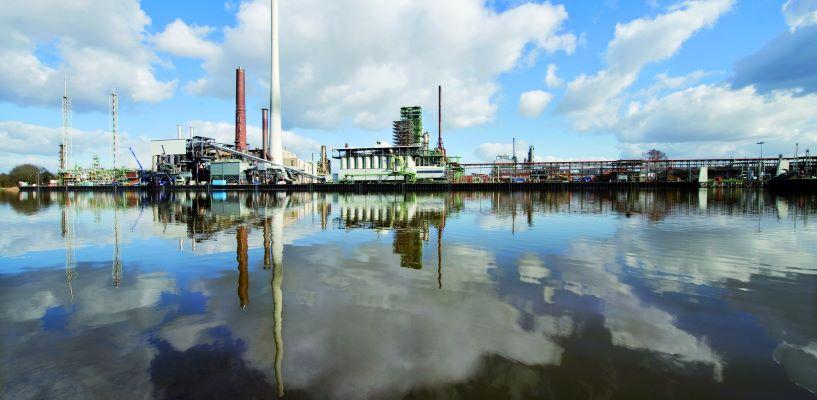
BP produces SAF in Germany
Oil and gas company BP has begun producing sustainable aviation fuel (SAF) at its refinery in Lingen, Germany, by co-processing used cooking oil together with fossil crude oil in its existing facilities. “The production at Lingen is part of bp’s aim to have a global market of 20% for SAF,” the company said. “Co-processing is an important step in replacing fossil fuel with renewable feedstocks within refineries. This production at Lingen will open up new supply opportunities in the region,” said Martin Thomsen, CEO of BP’s aviation fuel supply company Air BP.

Universal Hydrogen to base manufacturing in New Mexico
Zero-emission propulsion startup Universal Hydrogen will locate manufacturing and distribution of its modular hydrogen capsules and assembly of regional-aircraft powertrain retrofit kits in Albuquerque, New Mexico. The location at Albuquerque International Sunport provides access to a runway and the future potential to reopen a rail spur south of the airport. Universal Hydrogen’s (UH2) capsules are designed to be transported as dry freight using the existing intermodal freight network.

Deutsche Aircraft, H2Fly work on hydrogen-powered D328
Deutsche Aircraft and German hydrogen propulsion specialist H2Fly have begun work under a project to modify the D328 regional turboprop with a zero-emission hydrogen-electric powertrain for a 40-seat regional aircraft. The demonstrator aircraft is planned to fly in 2025.

H2Fly prepares to fly liquid-hydrogen fuel-cell propulsion
H2Fly’s test aircraft, the HY4, is being prepared for long-range flights on gaseous hydrogen before being modified to liquid hydrogen storage as a precursor to developing a hydrogen-electric-powered version of the D328eco regional turboprop with manufacturer Deutsche Aircraft. Shown, H2Fly’s fuel-cell-powered HY4 testbed undergoes gaseous-hydrogen refueling between test flights.

Airbus partners with Australian group on green hydrogen
Airbus and Australia-based Fortescue Future Industries (FFI) have signed a memorandum of understanding (MOU) to study the use of liquid hydrogen and power-to-liquid fuels for aviation. A joint taskforce will assess challenges around green hydrogen regulations, infrastructure and global supply chains. This will include the production of green hydrogen and the infrastructure needed to support delivery to airports and fuel aircraft.

Siemens-Protium team up on rapid hydrogen refueling
Process modeling specialist Siemens and UK green hydrogen producer Protium have launched a project to accelerate the design and testing of a rapid hydrogen refueling system for aircraft using digital twin technology. Protium’s stated ambition is to develop 1 gigawatt of green hydrogen production capability in the UK by 2030. Projects already in the pipeline will produce more than 500 megawatts by 2025 and include a 40-megawatt hydrogen hub to be bult in Teesside, England.

Japanese airlines partner to boost domestic SAF
All Nippon Airways, Japan Airlines, JGC Holdings and biofuel producer Revo International are founding members of a voluntary organization, “Act For Sky,” promoting the domestic production of SAF in Japan, which has set a goal of replacing 10% of its airlines’ jet fuel consumption with SAF by 2030 but has no domestic production capacity yet. Mitsubishi Heavy Industries joined the group in early March.

SWISS to use sun-to-liquid SAF
Lufthansa Group subsidiary Swiss International Air Lines (SWISS) will be the first to use sun-to-liquid SAF and expects to take delivery of carbon-neutral aviation fuel produced using concentrated sunlight in 2023 under a strategic collaboration with Swiss startup Synhelion, which plans to build its first industrial-scale solar kerosene plant this year in Julich, Germany. Production will start in 2023 with SWISS as the first customer.

Report: Short-haul electric flights could fly in Netherlands by 2026
Electrifying short-range aviation in the Netherlands will be feasible by 2026, concludes a report by airport consultants NACO and national aerospace research agency Royal NLR. The Netherlands has set the ambition of fully electrifying commercial short-haul aviation by 2050. “Despite the challenges, the researchers support the conclusion that it will be possible in the foreseeable future for electrically powered aircraft, with a capacity of up to 19 passengers on routes up to 200 km [125 mi.], to structurally take over the role of traditional aviation,” said NACO, which is owned by Dutch engineering consultancy Royal HaskoningDHV. Pictured, Netherlands aerospace research center NLR is gaining experience of electric aircraft with a Pipistrel Velis Electro.

Honeywell to help build SAF plants in China, Australia
Honeywell UOP is working with China’s Oriental Energy to build a large sustainable aviation fuel facility in Maoming in Guangdong province. When completed, the plant will have the capacity to produce 1 million tons (300 million gal) of fuel a year from used cooking oil and waste animal fats. Oriental Energy is a large distributor of liquid natural gas in China. The new plant will use Honeywell UOP’s Ecofining process to produce HEFA (hydroprocessed esters and fatty acids) sustainable aviation fuel (SAF), which is approved for use in aircraft in up to a 50% blend with fossil jet fuel.

Airbus, CFM to test A380 hydrogen-burning turbine engine
An Airbus A380 will flight-test a hydrogen-burning turbine engine by the end of 2026 under a collaboration between Airbus and CFM International partners GE Aviation and Safran. The planned demonstration will be a major milestone in Airbus’ ZEROe initiative to bring a zero-emissions airliner to market by 2035. The first A380 test aircraft, MSN001, will be fitted with a GE Passport business-jet engine modified to burn hydrogen and mounted on a stub support above the aft fuselage. Four cryogenic liquid-hydrogen (LH2) tanks will be installed in a hermetically sealed container and mounted in the lower aft fuselage.

Asia SAF supply set to grow
Efforts to increase the availability of sustainable aviation fuel (SAF) in Asia are gathering pace. In Japan, Itochu and Finnish fuel producer have expanded their partnership to make SAF available at the country’s two largest international airports: Toyko Haneda and Narita. On Feb. 17, Shell announced it had become the first company to supply SAF to customers at Changi Airport in Singapore. The energy company has also completed the upgrading of its Singapore facility to enable in-country blending of SAF. Increased capacity for SAF production is expected to come online at Neste’s refinery in Singapore by the end of the first quarter of 2023. The expanded plant will be able to produce 1 million metric tons (30 million gal.) of HEFA SAF a year from wastes and residues.
IATA recently stated that, “Flying net zero is a fiendishly difficult task that will happen because of systematic, small steps that we will pursue.” Here are some of those small steps that, when added together over the next 28 years, should enable the aviation industry to hit sustainability targets.
